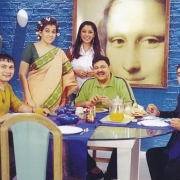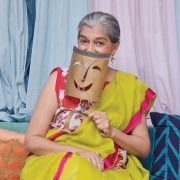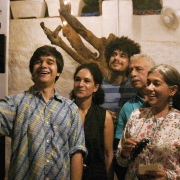
People

She has acted in just 16 movies in the past 33 years, but she made sure you noticed her in all of them. She tends to play characters who get lodged in your head and then sneak up on you to make you laugh at the oddest moments. Ratna Pathak Shah’s brand of humour bears a unique heft of tightly wound sarcasm and delicious wit. After a searing performance in Kapoor & Sons followed by an unforgettable outing in Nil Battey Sannata, she opens up to Rajashree Balaram about her views on film, society, family, education and why she thinks she is not a naturally gifted actor
It has been a decade since Sarabhai vs Sarabhai, the popular sitcom on Star One, came to an end. Yet people continue to write letters to the channel pleading for a second season. Though the fantastic comic timing of all the actors on the show made it one of the top TRP brags of its time, it was the snide jibes of Ratna Pathak Shah’s high-society Maya that audiences couldn’t get enough of. Never before has such a snobbish character been so ardently adored. “It was the fine scriptwriting that made it such a hugely popular show. If it weren’t for those lines, we would not have had the bandwidth of expressions to act out,” says the 59 year-old as we sit in her tastefully designed apartment in suburban Mumbai. Pathak is wearing a simple yellow kurta and printed salwar, her salt-and-pepper hair gathered into a casual knot.
Though she is warm and chatty, it becomes clear that she is not going to make it easy for anyone to read her. Her poker face when she is laying on the wit is delightful; her sarcasm off screen is just as sharply honed; and her eyes are unwavering. She doesn’t back off from a good argument, and it helps that she has a strong opinion on almost everything from religion, theatre, God and the hypocrisy of Indians to the standard of education in India, the lack of good roles for ageing women and the intrusive nature of social media. Most people know her as the better half of actor Naseeruddin Shah and as the co-founder of 37 year-old theatre group, Motley. But there are other facets to Pathak that are far removed from the spotlight. She also runs the Avehi Abacus Project, a unique educational initiative, launched nearly three decades ago, and one that has been quietly working to broaden the experience of schooling beyond subjects and scores. “In 1989, Shanta Gandhi who was the director of Bal Bhavan, Delhi, retired and moved to Mumbai, and brought with her the concept of integrated approach to education,” she explains. “The idea was to look at education from the point of view of a child, and not as biology, math, history and geography. Basically, it was all about how to form opinions, ask the right questions, and make the right decisions—a mind enrichment programme that could run parallel with the formal school system. We have three programmes: Sangati, which has been implemented in over 900 municipal schools in Mumbai; Manthan, a two-year programme meant for those who are studying to be teachers; and Saath Saath, a gender-based programme that addresses how notions of gender affect both boys and girls. Unless both boys and girls learn to think of themselves as human beings first, we are not going to have an ‘ungendered’ society.” Pathak says she loves working in the field of education because it is one of the most powerful ways to make a positive, lasting impact on society.
Daughter of renowned theatre and movie actor Dina Pathak, she and her sister Supriya are counted among the best character actors in the industry today. Yet when we ask her about her less prolific portfolio, she shrugs her shoulders: “I’ve always been very picky, not that filmmakers were queuing up outside my door. Then motherhood just consumed me. It remains the most beautiful role of my life, one that I wouldn’t trade for anything on this earth.” Pathak is both a doting and strict mother to actors Imaad, Vivaan and Heeba. “My kids have taught me patience. I can’t imagine how my mother handled me. I was rebellious and terrible.” One can understand where all that wonderful humour comes from—she knows best how to laugh at her own self.
EXCERPTS FROM AN INTERVIEW
Is cinema as exciting today as it once used to be?
Cinema is a business proposition for most of the people involved, and there is always a battle between trying to find something to say your way against a way that is acceptable to people who are putting in the money. There is that element of danger in the business of creating any kind of art form and, in a way, that is what drives us artists towards it. It is unfortunate that we only talk of films in terms of failures and success, and budgets and box-office figures. We need to move beyond that and analyse what a film is trying to say and how it is trying to do so. Eventually, art that moves us is always art that has a point of view. A novel that has disturbed you stays with you longer than one that has not. Art should force you to think, to make you face the ugly part of yourself, to accept that you are a bigot and a small-minded person. Only then will you learn to expand your heart and your mind.
Being so passionate about acting, why have you been restricted with your presence on screen over the years?
When I started out, I wanted to be a dramatic actress, but I never got those parts—thankfully. I got funny parts. And that surprised me because I always thought of myself as a straight-laced bore. So when Anand Mahendroo gave me the funnier of the two characters in TV show Idhar Udhar all those years ago, I was in seventh heaven. I am convinced that that role saved me, because otherwise I would have sat around waiting for a dramatic role. Also, I am not naturally gifted as an actress, and certainly not a funny actress. For Idhar Udhar, I had to learn everything on the job. To make things more challenging, there are no great teachers of acting in India, let alone funny acting. It was uncharted territory and, therefore, great fun.
But your performances always look so effortless.
That’s because there is a lot of effort that has been put into it! It is not as easy as it appears.
So, would you say theatre is the best form of education for actors?
Not necessarily. If you have done the wrong kind of theatre, you will end up being as fake and mannered as a lot of the actors around are. We need to re-imagine the whole business of acting. But then again, in India, what will an acting teacher train a student for? Hindi movies? How much of a challenge is that going to be? Today, acting is all about how to be a Bollywood star, so the prep is limited to horse-riding, dancing, being able to carry posh clothes and getting the right pout for a selfie. Bollywood doesn’t challenge you too much. So, to be fair, when an actor is never going to get an opportunity to use her voice in a certain way, why should she even bother to train herself?
Who are the most promising actors, according to you?
In theatre, I admire Shruti Vyas, Puja Sarup, Parna Pethe, Ratnabali Bhattacharya. These are a bunch of actors who are extremely skilled—they sing, dance and act, and they sometimes also devise their own work and write their own stuff. In the movies, Kalki [Koechlin], Konkona [Sen Sharma], Richa Chadda, Alia Bhatt, certainly. Vicky Kaushal, for sure. And yes, Ranveer Singh! I love to watch him. He is a guy who has the smarts in a way that I have not seen in a long time. He is so nice and brash, and thank god he is from a non-Bollywood family! It was getting kind of incestuous here with someone being someone’s uncle or aunt or brother.
Theatre must be a great release for you.
Theatre gives me a chance to occupy my mind with ideas that are so much greater than what I am capable of, and to play with words that are so much more beautiful than what I can come up with. Theatre is the only place where I can exercise. A dancer has steps that she needs to practise. What can an actor do? Theatre teaches you over and over again to act. Also, flukes happen more often in films than in theatre. Rajesh Khanna was a case in point; he was not an actor but a phenomenon that happened by fluke. And one day the phenomenon stopped happening, and it was devastating to see what followed.
Does Mr Shah critique your work? He must be brutal.
The word ‘brutal’ in conjunction with criticism lends it a very negative connotation. Critiquing is about watching something and understanding what worked, what didn’t and why. Naseer and I definitely critique each other’s work, but we are both too tough to be shattered by what the other has to say. I offer critical feedback only to a person I am interested in. For the rest, it is so much easier to coo ‘wonderful’ and be done with it. As for Naseer, he is intimidating because he is demanding something from you that demands you to exert yourself. I am happy to be making that exertion. It moves me into a direction that I would otherwise be lazy to try.
Actors are known to be temperamental, and yours is a family full of actors. How do you live under the same roof?
We have our moments. We fight, we sulk, we storm out of rooms, and we slam doors. But fortunately, so far at least, the rational aspect of all of us comes to the fore. The irrational does not stay alive for very long, thank god. We do have our moments, but nothing has caused a rift that has been unbreachable yet. I hope I am not speaking too soon! Jokes aside, there is a great deal of respect; all of us actually like each other. We would have liked each other even if we weren’t related. And theatre gives us a space where we can all interact together. If we had been in different professions, with other unique demands on our time and mind, I wonder how we would have connected.
You got Heeba, Mr Shah’s estranged daughter from his first marriage, from Iran to India, just after you got married to him. In his book, he has admitted that if it weren’t for you, he probably wouldn’t have had a chance to reconnect with her. What prompted that move?
It was just one of those decisions that needed to be done. I was helped immensely by the fact that Heeba was an extremely positive person at that time, which she continues to be. Despite being just in her teens, the dignity and openness with which she came into our lives was fantastic. She didn’t bring any baggage with her, and so it was very easy for us to accept each other into our lives. And then our son Imaad was born and she accepted Imaad with amazing joy and warmth. It just goes to show that it is, ultimately, unhappiness that makes people behave so badly with each other. It is so much easier to open your heart to happiness wherever you find it. I learnt this from my maami who opened her heart some more with every setback in her life. She is 88 today and full of beans, and such an inspiring figure for all of us.
Do you think our society makes ageing a more unforgiving experience for women?
I think there are many things that are downright unfair to women than men. Older actresses have a harder time getting good roles than older actors. And it would be such a waste to pretend that one is younger—I am growing old and I am very happy about it. But, having said that, my hair definitely limits my options as an actor.
Do you think the presence of women in cinema can only change when the audience is willing to accept them in non-traditional, offbeat roles?
We don’t have much of an opinion about women. We are used to seeing women as either sati or whore. We are also used to seeing men in neat binaries as villains or heroes. It is hard to write any nuances into characters then. Also, there are few women writers and even they are encouraged to write about men. Basically, women aren’t writing their stories as yet, as much and as often as they should. We are beginning to, but it will take time.
What else grabs your mind besides cinema and theatre?
I think the way in which our society is going ahead is definitely becoming more and more of a lasting interest to me. When my mum and aunts used to discuss the changes in society and the impact those changes bring, I used to get fed up, but now I find myself saying and thinking in similar ways. I am concerned because I have sat on the cusp of a quantum leap in terms of societal change. The Internet and mobile telephony have changed the world in such significant ways that I have not been able to process it yet. I have been on both sides—my parents’ generation that was making the shift from colonialism into independence and into a sense of India, and this generation for whom that sense of India has changed so dramatically. It bothers me deeply.
Why?
I have never been one for homogeneity. I like variety and I am proudest of this aspect of Indian culture. We have incorporated variety in every aspect of our lives, from the way we talk and dress to the way we eat and sing. There is no one way of doing things; we are improvisational. It was not enough for us to have a McBurger; we wanted an Aloo McTikkiburger! This can only happen in India. We are in large parts a country that was—and still is—happy in its plurality, but more and more we are trying to acquire a homogenised Western culture. We are letting ourselves be trapped by one way of looking at the world, one idea of Hinduism. We forget that Krishna danced with 16,000 gopi because each of those gopi wanted her version of Krishna. From child to lover, Krishna was all of that for them, for us.
So you fear a rigidity setting in?
I cannot stand what is being done to us at the moment. I am more worried that young people in India are toeing this line, and it is the worst form of hypocrisy. You say your world revolves around your parents, but you are willing to put your mother out on the streets if she is too old and gets too hard to live with. This dichotomy and hypocrisy is what we need to get past. But we are more focused on being vegetarians who won’t let non-vegetarians live in the same apartment. I am a vegetarian myself, but I cannot bear the vegetarian mafia that is so aggressively at work. I am worried that all of us are finding it harder to live with each other. Where is the India that could coexist peacefully with each other in all its diversity?
Are you active on social media?
There is too much being said already. I don’t want to add to the noise. I don’t want to say something unless I have something really different to say. Everyone is saying more or less the same thing. It would be more useful if I can act on it, or find a way to put my thoughts across in a play or a film. Social media, to me, is a whole lot of undigested thoughts—much like vomiting all over the place. In 1950, Samuel Beckett wrote Waiting for Godot, a play in which two characters have an exchange between them that seems so incredibly meaningful so many years down the line. One line goes ‘nothing to be done’—the characters repeat that over and over again. And then they both look towards the audience and one of them asks the other:
“What are these people doing?”
“They are talking.”
“What do they talk of?”
“They talk of themselves.”
“Why? To have lived is not enough?”
“No, it is not sufficient.”
I cannot tell you how much these lines keep coming back to me every time I hear about social media. For me, to have lived is enough. I have had a great time living this life.
Photos: Haresh Patel, Pic courtesy: Hats Off Production, Indian Express Archive / Vasant Prabhu Featured in Harmony — Celebrate Age Magazine July 2016
you may also like to read
-
For the love of Sanskrit
During her 60s, if you had told Sushila A that she would be securing a doctorate in Sanskrit in the….
-
Style sensation
Meet Instagram star Moon Lin Cocking a snook at ageism, this nonagenarian Taiwanese woman is slaying street fashion like….
-
Beauty and her beast
Meet Instagram star Linda Rodin Most beauty and style influencers on Instagram hope to launch their beauty line someday…..
-
Cooking up a storm!
Meet Instagram star Shanthi Ramachandran In today’s web-fuelled world, you can now get recipes for your favourite dishes at….










